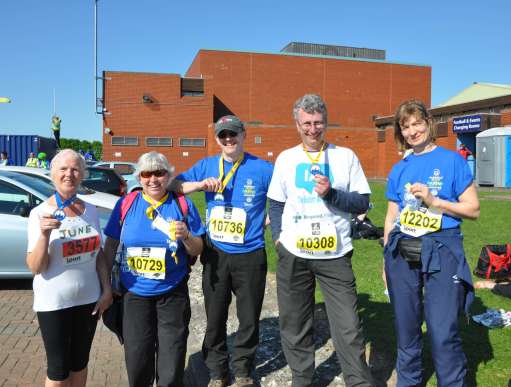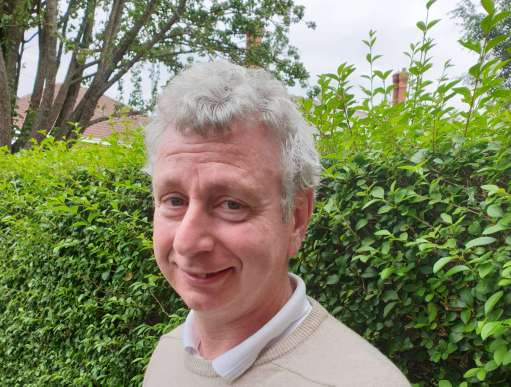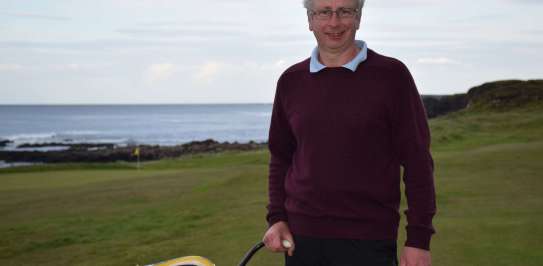For 25 years, a man from Larne, County Antrim battled a cruel illness that often left him exhausted until in 2009, drastic surgery gave him a new lease of life. Today he supports the life-changing work of Christian Aid so that people living in poverty might have a second chance too. Lisa Fagan spoke to Michael Bailie.
Michael Bailie (59) was in the final year of an engineering degree when he experienced the first symptoms of a disease that would blight the next 25 years of his life. He ignored the warning signs at first but within a few months, he’d been diagnosed with ulcerative colitis, an incurable disease of the bowel.
Despite his diagnosis, Michael graduated with an honours degree in mechanical engineering and began his working life at the Belfast shipbuilder, Harland and Wolff, before moving into a career working in government laboratories. His doctors did their best to manage his condition with medication but the illness took its toll on his personal life.
“I enjoyed my work because it was interesting, and I have many happy memories of the banter with colleagues. But too often it felt like that was all I did. You get locked into a recurring cycle of illness and tiredness and I had little energy for anything else. Even holidays were spent just recovering from work.”
Michael’s condition worsened over time and in 2009, he needed emergency surgery to remove his colon. Normally, this would involve a couple of weeks in hospital but in his case, complications set in after the surgery and he became gravely ill.
Image credits and information

“The surgeon told me months later that he had only lost three patients in his lengthy career, all were elderly and had other conditions, but he was worried that I would be his fourth.”
Michael spent three months in the Royal Victoria Hospital before coming home to convalesce but despite having to adjust to life with a stoma bag, he is focused on the positive.
“That operation was life-changing. After years of struggling to do things, you have no idea what a release it is to have energy again. It gave me back my life. I even completed the Belfast marathon - by walking, not running.”
Since his surgery, Michael volunteers occasionally with a charity offering support to other sufferers of bowel disease – people facing surgery or adjusting to life with a stoma bag. What does he tell them?
“It can be a struggle to come to terms with major surgery. Stoma patients often worry about the effects of the operation, both physical and social, and what the reaction of other people will be. I try to provide reassurance that there are solutions to the problems and that life with a stoma can be good. Mostly, I just listen. It’s important to let people talk and it helps the confidence of the speaker when the listener understands the problem.”
Almost fourteen years after the operation that ended his nightmare illness, what has the experience taught him?
“It taught me how fragile life is. I’ve been fortunate to always have had food to eat, a roof over my head and a bed to sleep in. I’m blessed to live in a country with a good National Health Service. If I’d been born in a poor country, I may have died early.
“It taught me what’s important in life too. I’ve never been the sort of person who wants a lot of stuff. I could spend money on a bigger car or the latest mobile phone, but I don’t need or want those things. That money could help a community that doesn’t have the things we take for granted.”
Michael has been supporting Christian Aid for many years. What sparked his interest in tackling poverty in the world’s poorest countries?
“When I was a wee boy, picky with my food and refusing to eat my vegetables, my mother would get frustrated with me and tell me that I was lucky to have food at all. She pointed me in the direction of the TV news of that time, the famine in Biafra. It was the first time I’d seen children with their bellies swollen with malnutrition.
“I was an adult by the time of the Ethiopian famine, watching Michael Buerk’s report for the BBC. I started full-time work in 1985 and decided to give regularly to environmental and development charities.”
Michael is a member of First Larne Presbyterian Church. What is it he likes about Christian Aid?
“I like the way Christian Aid works with local partner organisations to bring projects to their communities. It’s not top down - the westerner coming in and telling people what to do, as if we know better. They know the problems best because they live there, but our donations can help.
“Some people might think Christian Aid only does disaster relief after a hurricane or earthquake but there’s a lot more. They bring healthcare or clean water and sanitation to remote villages. They bring renewable solar energy to a community with no electricity supply, and help people adapt to climate change with drought-resistant crops.”
Despite everything Michael has endured through his illness, he remains grateful.
“I retired when I reached 55, fortunate to be able to walk away from work at an early age and at a time of my choosing. I live on my pension and my savings. I have enough.”
Image credits and information

Besides his long-standing donations to Christian Aid, Michael has pledged a gift to the charity in his Will:
“There will still be poor people needing help when I’m gone, so I want what I have no more use for to be used well.”
How’s he been enjoying his retirement? His face lights up with a broad smile:
“I can strongly recommend it! The main reason I retired early was to look after my mother who is 90, doing OK for her age, but she needs help.
“I play golf and I follow Larne FC, Arsenal and Ulster Rugby. At home, I do a bit of gardening, growing fruit, vegetables and flowers, and I’ve taken up my dad’s old hobby of woodturning. Since I retired I’ve even learned to cook a bit. Not quite Master Chef but I haven’t poisoned anybody yet. But the thing I really enjoy is hill-walking whether it’s in the Antrim Glens, the north coast, the Mournes or Donegal – the exercise, the scenery and the peace and quiet, they’re all good for you.”
Having lost 25 years of his life to illness, it seems only fair that Michael should be free now to enjoy an early retirement. And on the other side of the world, babies are being immunised, children are drinking clean water, and poor families are growing their own food - because of one man’s commitment to help others.
